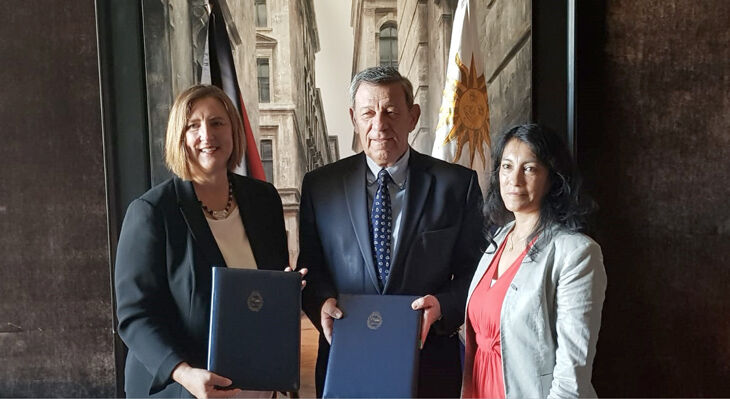BIBB is advising Uruguay on vocational education and training reform
The BIBB will advise the National Institute for Employment and Vocational Education and Training of the Republic of Uruguay (INEFOP) on the introduction of training structures in line with the German model. Uruguay is now the fourth country in Latin America, following Mexico, Columbia and Paraguay, to have entered into a cooperative arrangement with BIBB.

In the course of his visit to the Federal Republic of Germany, Uruguay's foreign minister Rodolfo Nin Novoa met with Birgit Thomann, Head of the BIBB's VET International department, as well as the project manager Constanza Correa Sarmiento on 29 May in Berlin. In the presence of the Uruguayan Ambassador Gabriel Bellón Marrapodi and envoy Paul Riezler Wenzel, the foreign minister accepted the contractual documentation relating to the cooperation between BIBB and the National Institute for Employment and Vocational Education and Training of Uruguay (Instituto Nacional de Empleo y Formación Profesional) INEFOP.
We are delighted about the consultancy contract which will be implemented in line with Uruguay's national strategies. BIBB stands for high-quality dual vocational education and training which is focused on business and labour market requirements and which therefore establishes the right vocational starting point for young people.
Birgit Thomann
Over a project term of 15 months, the BIBB will advise INEFOP in the areas of “Social partnership governance”, “Participation of relevant stakeholders in dual vocational education and training” and “Legal frameworks”.
There is one basic issue which both states share as a strategic priority—the education level of young citizens. Uruguay has therefore made the right decision in working with BIBB to establish the dual system of vocational education and training.
In Uruguay, INEFOPI is an independent public institution. Its task is to implement policies in the area of vocational education and training and to improve employment in Uruguay. Its governing body (Consejo Directivo) comprises representatives from the ministries of employment and education as well as employer and employee organisations including chambers.
The principal aim of the consultancy is to support Uruguay in implementing dual vocational education and training in line with the strategic objectives of the Uruguayan government.
A viable governance mechanism for dual vocational education and training is to be established over the course of the project. As part of this, the plan is to redefine and implement the roles and functions of Uruguay and stakeholders in vocational education and training. The legal framework for implementing dual vocational education and training in Uruguay is also part of the agreed vocational education and training cooperation. BIBB will check the existing legal regulations in Uruguay with respect to requirements for the introduction of dual vocational education and training and make recommendations.
BIBB has been advising Paraguay since 2017 on the introduction of dual vocational education and training. After Mexico (2008) and Columbia (2011), this is the BIBB's fourth cooperative arrangement with Latin America.